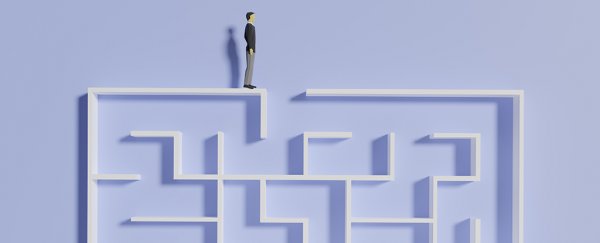Decisiveness is about making calls quickly and efficiently – even if those choices aren't always the correct ones. A new study looked at the relationship between confidence and decisiveness, finding that decisive people tend to be more confident about the decisions they've made.
On the other end of the spectrum is indecision, a distinct inability to work out a way forward or to commit to a particular path. In the study, even if both groups had made the right choices, those who second-guess themselves were less confident about their eventual decision.
Considering that making good choices is so important to our lives – in everything from our health to our careers – the research adds an interesting perspective on the fine interplay between confidence and decision-making.
"We propose that a positive confidence bias, coupled with appropriate metacognitive sensitivity, might be crucial for the successful realization of intentions in many real-life situations," write the researchers in their published paper.
"More generally, our study provides an example of how modeling latent cognitive processes can bring meaningful insight into the study of individual differences."
The key idea to get to grips with here is action control, which is about how we initiate, maintain, and finalize planned actions.
Action-oriented people, with a high level of action control, are good at realizing their goals – they're more flexible and resourceful when it comes to completing actions, and better able to deal with problems along the way.
Those with a low level of action control are known as state-oriented: They're less decisive and less likely to commit to something, they're not as good at adjusting their plans to meet their goals when situations change, and they're more likely to abandon projects if the chance of a successful outcome starts shrinking.
The researchers assessed 724 university students for their action control level, and then picked around 60 participants with either extremely high or extremely low scores. Across two experiments, these participants were then asked to complete tasks involving simple binary choices – choosing whether or not a group of dots was moving left or right, for example, or whether a series of fuzzy images represented faces or houses.
When it came to differences between the action-oriented people and the state-oriented people among the participants, the key was confidence in having made the right choice. When the choices got harder, the confidence gap got bigger. However, in terms of making the right calls, being action-oriented or state-oriented made no difference.
"When faced with fast-paced binary decisions, state-oriented people can respond as fast and accurately, adjust as flexibly to changing task demands, and incorporate additional information as parsimoniously as their action-oriented counterparts," write the researchers.
"The robustness of the confidence gap effect proves a pervasive link between metacognitive confidence bias and action control."
Confidence helps us to feel better about ourselves and can enhance social status; it's also been linked to better academic performance. Being more action-oriented is associated with other similar positive outcomes, including greater overall wellbeing.
What the new research suggests is that confidence and high levels of action control are also closely linked to decisiveness, although in this case a relatively small sample size and a series of very simple decisions were involved.
When it comes to more complex challenges and the decisions involved in them, the study authors say that confidence could influence how likely we are to progress through each part of a process, irrespective of our decisions – and that this confidence gap could be a key reason why some people succeed and others don't.
"Further research using different tasks and measures is necessary to confirm these speculations and extrapolate the generalizability of our findings to domains outside of perception and value-based decision tasks," write the researchers.
The research has been published in PLOS One.
